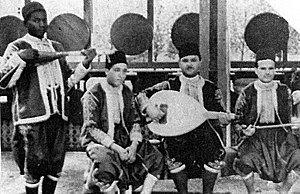Houcine Slaoui
This article does not cite any sources. (June 2015) |
Houcine Slaoui حسين السلاوي الحسين بن بوشعيب | |
|---|---|
 Houcine Slaoui on the left | |
| Background information | |
| Birth name | Houcine Ben Bouchaïb |
| Born | 1921 Salé, Morocco |
| Died | 1951 (aged 29–30) Salé, Morocco |
| Genres | Chaabi |
| Occupation(s) | Singer |
Houcine Slaoui (pronounced Husyn Slawi, Arabic: حسين السلاوي; real name Houcine Ben Bouchaïb; 1921–1951) was a Moroccan singer and composer who had a considerable influence on early-modern Moroccan Chaabi music.[1]
His nickname "Slaoui" was inspired by his birthplace, Salé. He appears as one of the principal craftsmen of the modern Chaabi songs in Morocco. He was one of the first to introduce modern musical instruments into Moroccan music. He was influenced by such middle-eastern artists as Mohammed Abdel Wahab and blended some of the styles of early Egyptian pop music into his songs.
He is most remembered for a song called "Lmarikan" (The Americans), a ballad that recounts his impressions of the Americans whom he has seen during the landing of American troops in Morocco in 1942 during Operation Torch. The song, which is still popular in Morocco today, has somewhat of a historical value and has been covered by various other artists.
Until this day his death circumstances remain mysterious.
Discography[]
- Aîta Bedaouia
- Hdi Rassak
- Ya Amina
- El American
- El Kahla
- El Kass Hlou
- N'zaha
- Dak Babaq
- Smra
- Sania Oul Bir
- Tanja
- Lalla Ilali
- Smra2
- Smr
- Alia
- Hahoua Tani
- Errada Errada
- Mouja Ghani
- Ya Ghrib Lik Allah
- El Haïlat
References[]
- ^ Hachlaf, Ahmed. (1993). Anthologie de la musique arabe : (1906-1960). Hachlaf, Mohamed Elhabib., Centre culturel algérien (Paris, France). Paris: Centre culturel algérien. ISBN 2-86600-476-0. OCLC 29782782.
- 1921 births
- 1951 deaths
- Moroccan composers
- Moroccan male singers
- People from Salé
- 20th-century singers
- 20th-century composers
- 20th-century male singers